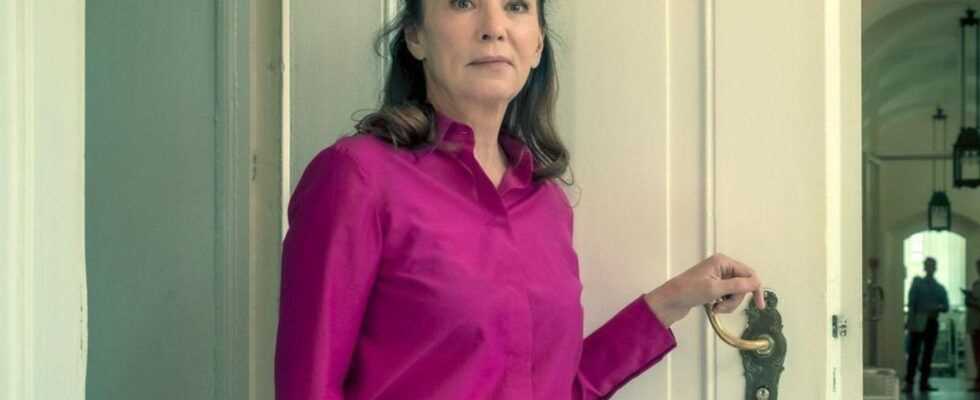"Das Unwort" is an anti-Semitic comedy. Actress Iris Berben explains in an interview why she doesn't stop getting involved.
"Das Unwort" (November 9th, 8:15 pm, ZDF) is a highly amusing, grandiose, chamber play-like comedy about a very serious topic: anti-Semitic bullying in schools. After 15-year-old Max Berlinger (Samuel Benito) bit off the earlobe of his classmate Karim Ansari (Oskar Redfern) and broke the nose of another, Reza Marschner (Victor Kadam), Max is threatened with expulsion from school.
The crisis talk at Berlin's Westendgymnasium between the overwhelmed parents (including Thomas Sarbacher, Neda Rahmanian), headmaster Stege (Devid Striesow), class teacher Annika Ritter (Anna Brüggemann), caretaker Eichmann (Florian Martens) and the representative of the school supervisory authority, Dr. Gisela Nüssen-Winkelmann (Iris Berben), escalated. Because as it soon turns out, the incident has a history.
Actress Iris Berben (70) calls the fact that the film about everyday violence, prejudice, exclusion and the challenge of dealing with it will be broadcast on November 9th – one of the days of remembrance for the victims of National Socialism – "a statement". In an interview with spot on news, the 70-year-old explains, among other things, why she does not stop with her commitment to anti-Semitism.
Why did you accept the film "Das Unwort"?
Iris Berben: I read the script and was immediately fascinated by the ease and humor with which director and screenwriter Leo Khasin told such a deep, difficult, serious and serious topic. He shows the struggles and motivations of the protagonists and yet lets them all step on the fender. I've already watched the finished film and I'm really extremely satisfied with it.
What is the eponymous unword?
Berben: Jew.
The film is based on a true case. How common is anti-Semitic bullying in schools?
Berben: The film was made after very detailed research by the director, who also wrote the script. There is a book about anti-Semitic bullying in schools and all cases in it are understandable and unfortunately happened too.
At first, the conflict between two students, which is discussed in the context of a parents' evening, looks completely different than it then turns out. Is the film a plea for always listening to both sides first in the event of a conflict?
Berben: Yes, exactly. And that's the exciting thing about this whole topic: There isn't one single big answer. And if it does, then it might be that we have to accept that there is difference and that this can mean diversity and enrichment. It is wonderful that we can live in different worlds, religions and cultures. Of course, it requires understanding for one another. That, in turn, can only come about if we are interested in others. To insist on your point of view does not help.
What do you like about your role, Dr. Gisela Nüssen-Winkelmann, particularly exciting?
Berben: She is a stereotypical woman who hides behind behavioral measures and regulations. When Dr. If Gisela Nüssen-Winkelmann then loses control, exactly what happens to everyone else in the film happens to her: she makes a mistake. At this point it is shown with a certain sense of humor that we can all get into this situation, even if we are liberal and open-minded. In this respect, we should all question ourselves regularly: Where do I exclude myself? Where do I have prejudices?
The class teacher embodies a so-called "do-gooder". What do you think of the term?
Berben: For some it's a negative word, for me it's still a good word. Because what can be bad about the word "do-gooder"?
The film will air on November 9th. What do you make of it?
Berben: The fact that the film will be broadcast on November 9th is a statement from ZDF. On November 9th, of course, you think about the Holocaust, what these people suffered and had to endure. And yet we also have to find a bridge to today, because anti-Semitism has become more noticeable, more noticeable and louder again.
Does it make sense to think about current events in Israel in this context?
Berben: I don't think so. One shouldn't mix Israel politics and anti-Semitism in this country.
You have been campaigning against anti-Semitism for decades. How do you manage to keep yourself motivated, even though you might sometimes feel like it just won't change?
Berben: You are right, of course I also have these moments when I ask myself: What am I actually achieving with it? Then I remember that we live in a powerful society with poise. The others are the much smaller part, but especially loud. The alternative to engagement would be nothing to be done. But with that you leave the terrain to the others. That must not be. Most of society thinks differently. We just have to get louder and show the good examples so that the others don't dominate the media world so much.
